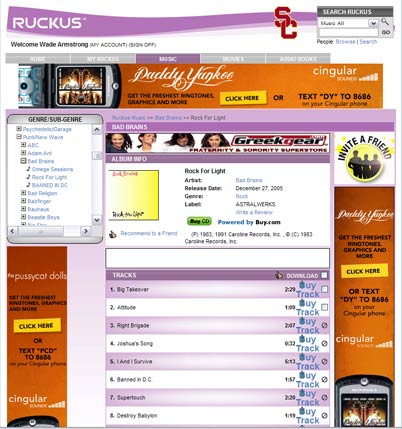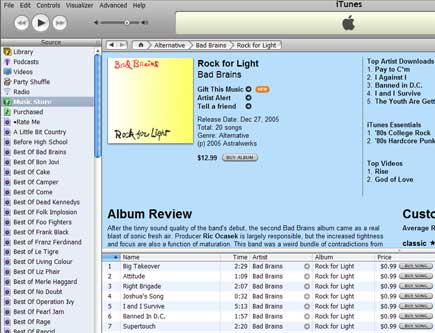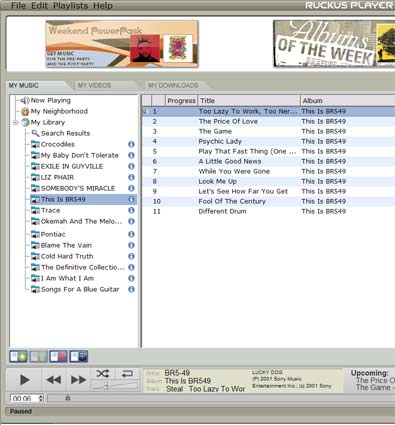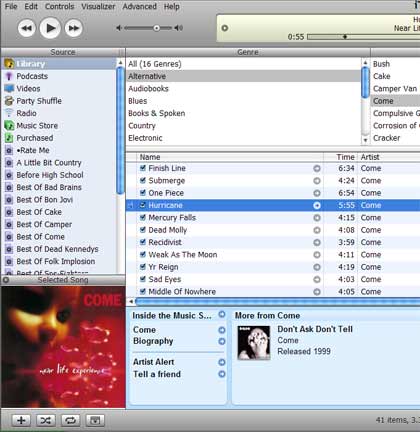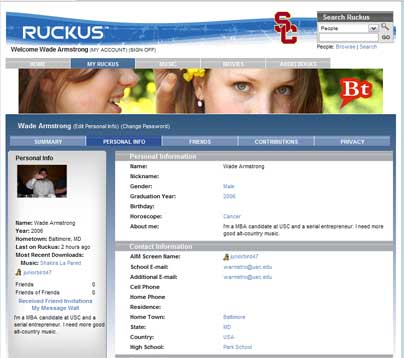Published Mar 12, 2006
USC offers one of those subscription-based music services, Ruckus, for just $10/semester to its students. I’m a cheap-ass motherfucker and $10 hits that cheap-ass spot just right, so I signed up. Heck, it’s a standard Microsoft-based music rental service, so I also thought it would be a fun idea to check and see if I would like renting, rather than buying my music (at least I’d get to write a review!). The conclusion? The rental model demands an incredibly high level of execution — a level that’s absent — and is uncompelling at the moment.
So how does Ruckus stack up against iTunes and the associated music store? Let’s break it down:
Selection
Ruckus has some great, less-popular music; a wide selection of the more obscure stuff, which matches the service’s focus on the college market. Not all of these artists are on iTunes, and some are also absent from most retail locations, so it’s nice to have access to this music in a digital form. iTunes’s selection appears to be several orders of magnitude larger, however.
Searching and browsing music is done through your Web browser, not the Ruckus application itself, which makes one appreciate iTunes and its variety of easy-to-use widgets and sortable columns. However, searching and browsing within the Ruckus Web site is generally fairly usable. One odd feature is the use of an expandable tree on the left-hand side of the window, containing all of the genres and then, when expanded, the artists within a genre. This makes it easy to see the whole selection but is daunting in more-popular genres.
The choice of genres is also odd; there’s a separate top-level Ska genre, but Punk is under Rock (actually, it’s New Wave/Punk, which is unlikely to make either New Wave or Punk fans happy) and Alt-Country is under Rock, not Country.
Score this one: iTunes, for the interface, organization, and breadth of selection
Player Application
Of course, once one has selected a song, one must acquire and then play it. This is a simple one-click process in iTunes and only slightly more complicated in Ruckus. The first time you download a song in Ruckus, your Web browser asks you with what application you want to open the file with; just choose the Ruckus application and everything works well from there on. Both applications take a while to download the song to your computer but Ruckus is perceptibly slower.
That’s the end of the similarities, however. iTunes uses a completely custom player, especially designed for music, to organize and play all of your MP3s and AACs. Ruckus’s Player only works with Ruckus files, but you can play your Ruckus music with Windows Media Player, if you like. Neither has an interface that’s remotely as usable as iTunes. The Ruckus Player, in particular, is not a very polished application; it just looks sloppy.
There are too many meaningless colors in that window, and too few meaningful ones. The bright white background makes the banner ads stand out too much — and they take up so much room! The only method available for organization is the playlists on the side; there’s no way to browse by album or genre or rating or anything like that. Even the playlists look less attractive than do playlists in iTunes. The only good parts are the shading in alternate rows in the song window, which makes the whole thing easier-to-read, and the live search, which works well and the Ruckus Player even highlights the text that matches the search, useful when you’re not getting the results you expect.
Perhaps because the Ruckus Player lacks any meaningful organizational tools besides the playlists, a playlist is automatically created for every album that you download. This really clutters the interface once you get past a few albums. The one nice touch is that the next song up is shown next to the playing song.
The same lack of care has been shown with the system tray widget, which only offers play/pause and next/previous buttons. Compare this to the default iTunes widget, which includes the above plus song info, rating tools, play mode control, and more.
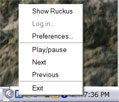
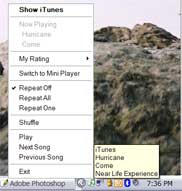
It’s tempting to think that the Ruckus service was designed to work without the Ruckus player, so that you could just use whatever PlaysForSure-compatible music player you pleased. Unfortunately, to gain and renew your license for the music, you need the Ruckus player (more on this later). Somebody assumes that you’ll use the Ruckus player, and it’s sad that said player is so mediocre. At least it’s not crash-y or slow.
Score this one: iTunes, for the interface and usability
Features
Ruckus’s special sauce is probably its community tools; every user gets a page, and each user can post information about themselves and small statements there. Every other user can also see what each user has downloaded and played recently; a problem if you have a secret Shakira thing like I do.
You can watch your friends and check out the music they’re listening to, but there’s not that much communication or personalization possible (probably a good thing since people who would really want to do things beyond discovering new music would probably use something like MySpace). It’s potentially a cool idea, although there’s really no way to explore and find new people who might match your musical taste and dig deeper into what they like. The old Napster was good with that; you could browse a user’s entire collection and, if you were downloading a lot from a specific person, you could try some more of their library out. Today, we have Last.fm, a Web site that tracks what you listen to in iTunes or on your iPod and suggests music that you might like, based on other similar users; you can also search for users with similar tastes. This kind of functionality seems to me to be a no-brainer for Ruckus.
iTunes lets you create iMixes, which are published playlists that others can find on the iTunes Music Store. The iTunes Music store does a good job of integrating them into the content, linking to top-rated ones from the bio of an artist. iTunes also lets you listen to the songs that people around you are listening to, a fun feature (perhaps you can meet someone this way!). To this extent, despite the lack of profiles, iTunes actually does a better job of recommending music, although no community is really created. iTunes’s real special sauce, however, is probably its FrontRow integration — Apple wants to own the living room, not the internet!
Score this one: iTunes, because its music recommendations are the real killer app here
MP3 Players
None of my Ruckus songs will sync to my iPod. Given that the iPod has something like 78% market share, it’s kind of ridiculous that a service would be totally incompatible with that hardware. Ruckus songs will sync with anything bearing the PlaysForSure logo, it’s true, but that’s not much of the market. I’ve considered buying a player program for my cell phone, because a lot of the high-end cell phones (including my Treo) can play music off of Ruckus, but I’m not sure that I’m prepared to switch back and forth between two music players. Besides, as seen in the next section, I’m not sure that I want to worry about my Ruckus songs on a hardware player.
Score this one: iTunes, because the iPod owns the MP3 player market now and not working with it is just disastrous
PlaysForSure
That brings us to the big catch, the real product killer, the thing that, as I mentioned in the intro, renders the product uncompelling. PlaysForSure is Microsoft’s system that supposedly ensures that you can play your rented music on any device at any time. At least that’s the idea. I only tried the whole thing with the Ruckus Player on my laptop, but the level of function wasn’t spectacular. Most of the time, my songs played. Sometimes, however, Ruckus’s key servers were unavailable, and that is a major problem.
PlaysForSure songs are rented for a certain period — typically, a month — and, every time the song is played, the player checks that the song’s rental period hasn’t yet expired, by looking at the database on the computer itself. If the database indicates that the rental period is over, then the player checks with the song’s owner (in this case, Ruckus) by talking to a server over the Internet. So long as the database is available, the song can be re-authorized. If, however, the database is not available, then you can’t listen to the song, period.
A number of times, Ruckus’s servers appeared to be down; then I lost all songs without a current license. I simply couldn’t play them and nothing could be done to re-authorize them without Ruckus’s servers coming back. Worse, when I went on vacation over Christmas, some of my songs expired while I was on the road and couldn’t be re-authorized until I got home and had Internet access again. Why weren’t the songs authorized each time I played them and had an Internet connection available? To put a nail in the coffin, by the time I got home, virtually all of my Ruckus songs had expired. What would have happened if I’d brought a PlaysForSure MP3 player with me to Costa Rica? It’s unacceptable that I could end up on vacation with my songs expried and no easy way to re-authorize them. To this extent, the rental model is broken. Until PlaysForSure deals with likely eventualities, such as a network interruption, server outage, or vacation travel, it’s a key thorn in the side of any music rental system.
In contrast, I’ve never had trouble keeping any of my FairPlay-enabled songs going on my iPod, even on trips nearly a month long.
Score this one: iTunes, because it Just Works
The Rental Model in General
PlaysForSure is just the vehicle for delivering rented music, so it’s unfair to judge all rented music based only on how Ruckus does right now. A better question to ask would be: how did I feel about renting all of my music?
In general, I was fine with the idea. Certainly, it encouraged me to browse and try artists whose music I might otherwise not have given more than a single listen ($0.99/track is too much to take a total lark on). On the other hand — and this might just be the distrust of PlaysForSure talking — I feel like I want to own anything I really love. iTunes gives me this kind of ownership, more or less. I suspect the ultimate model here is “rent to try, buy to own,” and a well-designed rental service, in Ruckus’s place, would complement iTunes and encourage exploration. Rental, however, is by no means out of the question for me, were the technical execution properly worked-out.
The Verdict
I was actually thinking this would end up a closer fight, but the fact is that iTunes wins, handily in most places. Ruckus also has a fatal flaw, the insufficiently reliable PlaysForSure authorization system (I realize that PlaysForSure is, most likely, performing exactly to spec; but the spec is broken). Still, $10/semester is cheap enough, and $5.99/month may well be cheap enough too — some of the other PlaysForSure services are priced at that level — so, if you’re looking to sample some with little commitment, try one out, just don’t expect the same quality of experience that you get with the insanely market dominant iTunes + Music Store + iPod combo.

